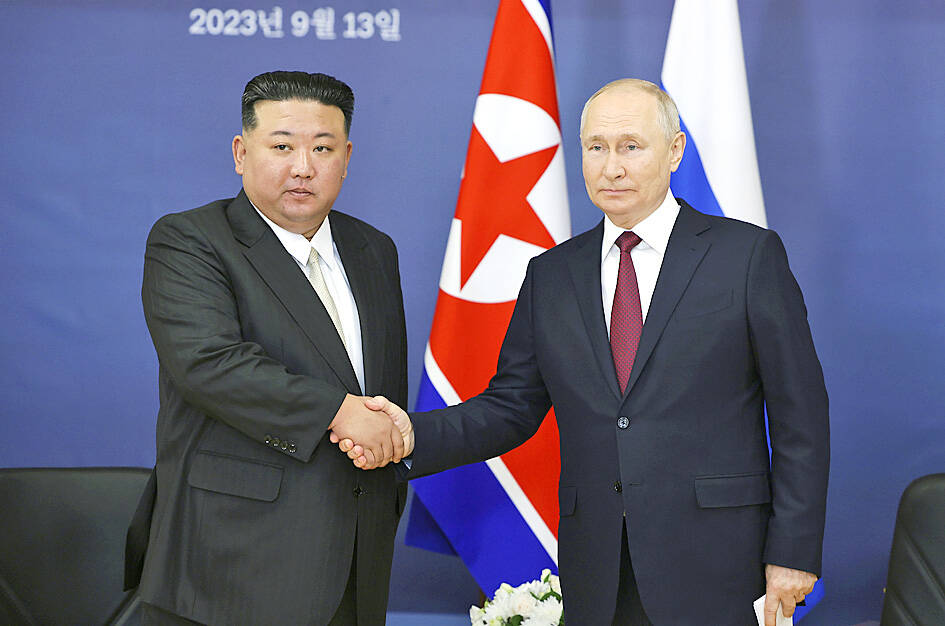Train traffic between North Korea and Russia has spiked dramatically following a recent summit between North Korean leader Kim Jong-un and Russian President Vladimir Putin, indicating a “likely” transfer of arms, a new report by Washington-based analysts Beyond Parallel showed.
High-resolution satellite imagery reveals at least 70 freight cars at North Korea’s border Tumangang Rail Facility, the group said on Friday, a number described as “unprecedented” even when compared to pre-COVID-19 levels.
No more than 20 cars had been seen in the railyard over the previous five years, the report said.

Photo: AP
The flurry of activity “likely indicates North Korea’s supply of arms and munitions to Russia,” the report said, adding that tarps covering the shipping containers made it impossible to “conclusively identify” their contents.
The analysis came a day after CBS News cited an unnamed US official as saying that North Korea had begun transferring artillery to Russia for use in its war in Ukraine.
Last month’s face-to-face meeting between Putin and Kim sparked widespread concern among Kyiv’s allies over the possibility of a potential arms deal.
North Korea, which the US has previously accused of supplying shells to Russia’s Wagner Group, is a mass producer of conventional weaponry and is known to be sitting on large stocks of Soviet-era war material — albeit in unknown condition.
Russia has ramped up production of shells this year to a forecast 2.5 million, but analysts have suggested that could fall short of its needs on the battlefield.
Moscow’s forces are firing about 60,000 rounds per day, Ukrainian data showed.
While Russia said that no agreements were signed during Kim’s visit, Putin said he saw “possibilities” for military cooperation.
Russia and North Korea, historic allies, are both under a raft of global sanctions — Moscow for its invasion of Ukraine, and Pyongyang for its testing of nuclear weapons.
The White House has said that any arms exports from North Korea to Russia “would directly violate multiple UN Security Council resolutions, including resolutions that Russia itself voted to adopt.”

ANGER: A video shared online showed residents in a neighborhood confronting the national security minister, attempting to drag her toward floodwaters Argentina’s port city of Bahia Blanca has been “destroyed” after being pummeled by a year’s worth of rain in a matter of hours, killing 13 and driving hundreds from their homes, authorities said on Saturday. Two young girls — reportedly aged four and one — were missing after possibly being swept away by floodwaters in the wake of Friday’s storm. The deluge left hospital rooms underwater, turned neighborhoods into islands and cut electricity to swaths of the city. Argentine Minister of National Security Patricia Bullrich said Bahia Blanca was “destroyed.” The death toll rose to 13 on Saturday, up from 10 on Friday, authorities

OPTIMISTIC: A Philippine Air Force spokeswoman said the military believed the crew were safe and were hopeful that they and the jet would be recovered A Philippine Air Force FA-50 jet and its two-person crew are missing after flying in support of ground forces fighting communist rebels in the southern Mindanao region, a military official said yesterday. Philippine Air Force spokeswoman Colonel Consuelo Castillo said the jet was flying “over land” on the way to its target area when it went missing during a “tactical night operation in support of our ground troops.” While she declined to provide mission specifics, Philippine Army spokesman Colonel Louie Dema-ala confirmed that the missing FA-50 was part of a squadron sent “to provide air support” to troops fighting communist rebels in

Two daughters of an Argentine mountaineer who died on an icy peak 40 years ago have retrieved his backpack from the spot — finding camera film inside that allowed them a glimpse of some of his final experiences. Guillermo Vieiro was 44 when he died in 1985 — as did his climbing partner — while descending Argentina’s Tupungato lava dome, one of the highest peaks in the Americas. Last year, his backpack was spotted on a slope by mountaineer Gabriela Cavallaro, who examined it and contacted Vieiro’s daughters Guadalupe, 40, and Azul, 44. Last month, the three set out with four other guides

Local officials from Russia’s ruling party have caused controversy by presenting mothers of soldiers killed in Ukraine with gifts of meat grinders, an appliance widely used to describe Russia’s brutal tactics on the front line. The United Russia party in the northern Murmansk region posted photographs on social media showing officials smiling as they visited bereaved mothers with gifts of flowers and boxed meat grinders for International Women’s Day on Saturday, which is widely celebrated in Russia. The post included a message thanking the “dear moms” for their “strength of spirit and the love you put into bringing up your sons.” It